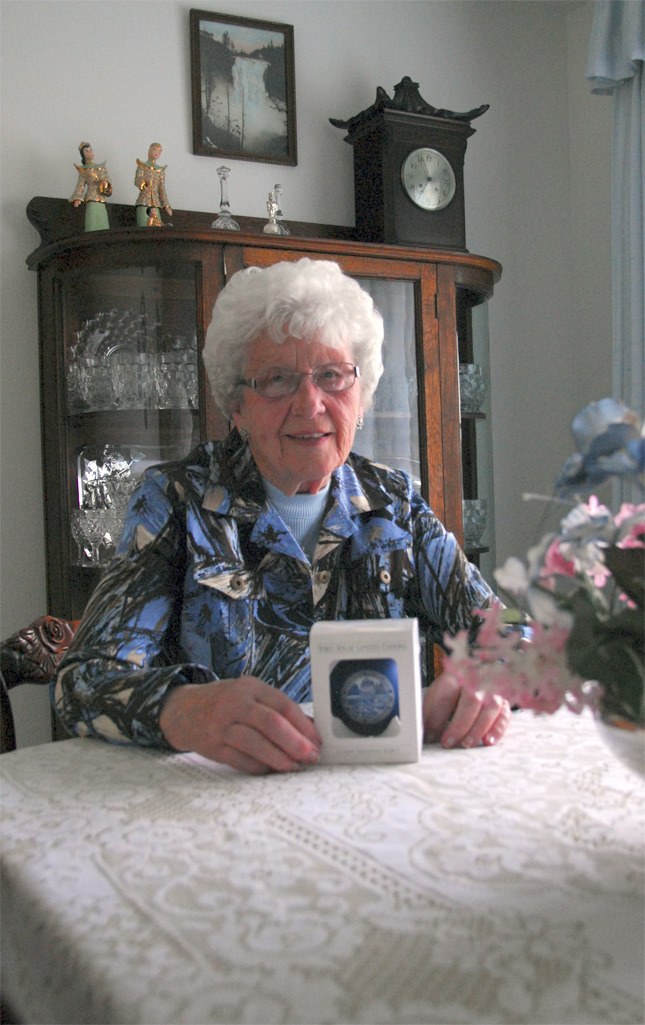Retirement does not suit Isabel Jones. It’s been more than 30 years since Carnation’s de facto historian last worked for a paycheck, but she’s never really adapted to the leisurely lifestyle.
She and her late husband Ben, used to travel all over the country, she said, for conferences and to golf, but she always preferred their home life.
“I told Ben, ‘I don’t have any of my hobbies here, and I can’t go to any meetings,’” she explained.
These days, Jones has a full slate of meetings most of the time. She is the director of the Tolt Historical Society Museum, so she’s on call to give tours of the museum (by appointment only). She volunteers at the Sno-Valley Senior Center, sits on the board of the Carnation Chamber of Commerce, and meets with friends regularly to bowl and to play cards. Today, she leads the parade as Grand Marshal for the Great Carnation Fourth of July celebration, and for the rest of year, she is helping to plan the city’s 100th anniversary celebration.
“I didn’t know to think it was an honor or not,” Jones said, about her selection as parade marshal, “because I’m the oldest one in town, that’s lived here my entire life.”
Jones arrived in Carnation only about 11 years after the city was first incorporated. She was the sixth of seven children, born to William and Mary Larson, and the granddaughter of John T. Larson, who homesteaded land in what is now Carnation’s Swiftwater neighborhood. She was born on the farm, which her father took over when his father died, and lived there until graduating from Tolt High School in 1941.
Although there wasn’t any type of Running Start programming then, Jones had already done all the schoolwork she needed, and landed a job well before her graduation date.
“My senior year, I had enough credits to graduate,” she explained, because she took a full class load every year, and got credit for her involvement in band, glee club, baseball, basketball, and as a student body officer. “My father always made sure we could take part,” she said.
Facing a whole year of redundant schooling, Jones found another option, at the local post office.
“The gal that was working at the post office… she wasn’t a kid any more, and she had her first baby, so Mrs. Simmons wanted me to come to work,” she said.
With the superintendent’s OK, that’s what she did, until the end of 1942.
“Then I went up to Snoqualmie Falls Lumber Company, which turned into Weyerhauser in later years, and I was going to make my fortune. I think the biggest paycheck I had was three hundred and some dollars,” she said wryly.
At least she got a check. She recalled several coworkers who never did, since they charged everything to the company store. “I never charged a penny,” Jones said. “I wanted my whole paycheck!”
However, with one part-time exception in the 70s, Jones gave up her paychecks in 1943. That’s when she married Ben Jones, who asked her not to work any more, because he didn’t want “everybody in Carnation” to think he couldn’t support her, she said. “So I quit work, and was a stay at home mom, and played with my kids like they were dolls… I still love dolls, and I still love little kids.”
The Joneses made two starts at making their home. Ben’s father had objected to the location they first chose, and divided his own property in the city, giving half to the newlyweds “to build your own shack,” Jones said.
Ben was concerned about the exact placement of the front lot line, and asked his dad about it, Isabel recalled, laughing. “He said — you had to know Grandpa, to understand his language — but he said ‘Kid, don’t worry about it. You’ll never live long enough to see sidewalks in Carnation.’”
He was right, too. Ben passed away in 1995, just a year before the city put sidewalks into their neighborhood.
Jones has seen lots change in her lifelong home. She misses the days when “you could buy anything,” at the local grange store, and they delivered it. Back then, she said “You charged your groceries for a whole month.”
Carnation had a hospital, a pharmacy, and a dry goods store then, and the Joneses were able to build and furnish their next home, just outside city limits, ordering all of the furnishings locally. But then World War II hit home, and “all the women went to work,” Jones said. “They all started buying in Kirkland or Bellevue or Seattle, and our stores couldn’t make a living.”
The city has had its struggles, but also its accomplishments, like the long-awaited sewer system that began operating in 2007. Jones is looking forward to the city’s months of centennial celebrations ahead, too. It will keep her busy, which she prefers, as long as it doesn’t interfere with her bowling, card games, or now, her afternoons of Mexican Train.
“That trick, I just picked up last week!”



